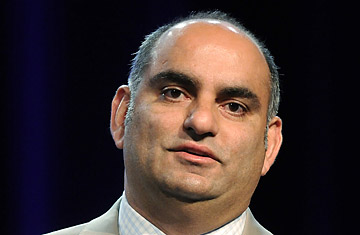
Mohnish Pabrai, managing partner with Pabrai Investment Funds, speaks during the Value Investing Congress in New York, on October 13, 2010.
When Mohnish Pabrai was a child he was lucky enough to attend an elite private school in his hometown of Mumbai, India. For several years, he sat next to a classroom window that overlooked an immense slum that flooded during monsoons and blistered in the heat. Every day, he watched as the slum's inhabitants struggled with basic survival. Only 10 feet away from this destitution, young Pabrai felt as if there was an unbridgeable gulf between him and the caste of Indians known as "the untouchables." "Not once did any teacher ever acknowledge there was anything worth looking at out that window," Pabrai says. "You had the constant smell of raw sewage, but it was never mentioned."
Decades later, Pabrai, now 47, is doing more than reminisce about the horrors he witnessed outside that window. A wealthy hedge fund manager, Pabrai has come up with a way to lift some of the most desperately poor children out of those slums. By creating The Dakshana Foundation, a market-based philanthropy with clear and sustainable objectives that are easy to measure, Pabrai is sending hundreds of Indian students to the country's most elite technical university — and therefore giving them a shot at a life-changing career.
It would certainly be simple for someone like Pabrai never to look back. As the managing partner at Pabrai Investment Funds in Irvine, California, he is a millionaire many times over. Pabrai was once featured in Forbes magazine in his pajamas, a symbol of the easy life, and in 2008, he shelled out $320,050 to have lunch with his business idol, Warren Buffett (whose investment style Pabrai emulated with his family of hedge funds). Yet, he says that vision of poverty he witnessed through his classroom window has haunted him all these years: "In some subconscious way that permeated and influenced me."
Inspired by Buffett's decision to donate his fortune to the Gates Foundation, Pabrai and his wife, Harina Kapoor, decided they would start giving away roughly $1 million a year as their net worth crossed $50 million. Although at first he wasn't sure how to give away his money, he knew he wanted to be able to quantify his charitable offerings rather than use them to just sit on a museum board with other wealthy investors. He also looked at simply writing a check as an old man's sport. "I have the energy of a lifetime to build something," he says. "I can start experimenting now with the clear understanding that many of my experiments will fail."
A firm believer in education as a golden ticket, in 2007 Pabrai set about establishing special two-year boarding schools where impoverished yet highly intelligent students can study to take the Dakshana-subsidized entrance exam for the prestigious Indian Institutes of Technology (IIT). With a 2% admission rate, it's the most exclusive technical university system in the world. Tuition is free, but the entrance exam is expensive and daunting. Many hire costly tutors prior to taking the test. Five years later, Pabrai's schools are producing some extraordinary results. Nearly three quarters of Dakshana's graduates were accepted by the IIT system last year. And if a Dakshana scholar does not pass the IIT exam, he or she is then encouraged to take the exam for another college, such as the National Institutes of Technology (NIT).
Pabrai runs his foundation, Dakshana (which means "sacred gift" in Sanskrit), as swiftly and successfully as he runs his hedge fund. His foundation has a single, narrow focus and is committed to methodically measuring social return on investment — easy enough, the end game being how many kids get into IIT. After a few trials and errors, which he cheerfully spells out in his annual reports, he has now nailed down a successful formula. He has only three full-time employees, including CEO Colonel Ram K. Sharma in Pune, India, two part-timers and a slew of volunteers.
Pabrai focuses on older students already attending the Jawahar Navodaya Vidyalaya (JNV), a government-funded rural school system. Dakshana plucks the top 10% of the approximately 40,000 kids who take a 10th grade government exam, and offers them an IQ test and entrance exam. The top students from this round are then offered room and board in eight countrywide campuses and full-time coaches to prepare for the IIT exam two years later. In a unique collaboration, the JNV system pays for the room and board, but Dakshana pays for the top-notch education, the exam fees and, according to Colonel Sharma, some extras like quality food and medicine. Once the student is accepted into the IITs or NITs, Dakshana will help with grants and scholarships for out-of-pocket expenses. As word gets out about this program, applicants are growing in number — and so are open slots. Last year, there were 214 new Dakshana scholars; this year about 450. Next year, Pabrai says they will offer scholarships to 700 kids.
The funding comes in part from Pabrai's own money. After studying how Warren Buffett gives away his earnings, Pabrai decided to go with an annual give-away of 2% a year, which is about $1 million. He also brings in about $1.3 million from other donors. While they initially spent approximately half a million a year, this will increase to about $2 million as they add more scholars and contribute to new campus infrastructure. Pabrai expects Dakshana's growth rate to be about 40% or 50% over the next four to five years — and that his family's contributions will eventually end up at about a quarter of the total contributions. So far, since Dakshana's inception, the foundation has spent just over $3.5 million.
